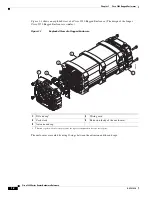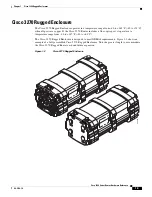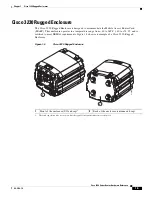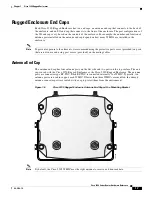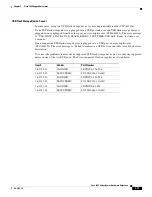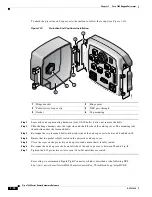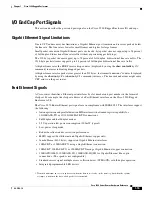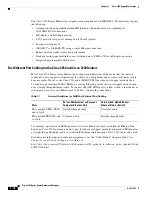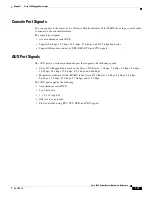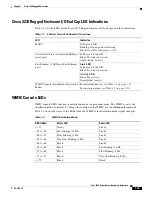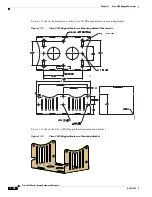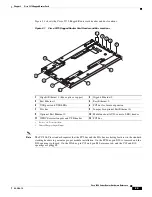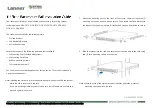
1-15
Cisco 3200 Series Router Hardware Reference
OL-5816-10
Chapter 1 Cisco 3200 Rugged Enclosures
I/O End Cap Port Signals
This section describes the ports and port signals on the Cisco 3200 Rugged Enclosure I/O end caps.
Gigabit Ethernet Signal Limitations
Due to CPU and memory bus limitations, a Gigabit Ethernet port transmits and receives packets below
the line rate. The line rate is lower for small frames and higher for large frames.
Small packet streams on Gigabit Ethernet ports, such as 64-byte packet streams, support up to 24 percent
of full duplex, bidirectional line rate traffic without experiencing packet drops.
The 512-byte packet streams support up to 78 percent of full duplex, bidirectional line rate traffic. The
1518-byte packet streams support up to 88 percent of full duplex bidirectional line rate traffic.
At higher frame rates the RDRP receive drop counter (displayed by using the
show controller
g0/0
command) increases indicating dropped packets.
At higher frame rates for packet sizes greater than 512 bytes, the transmit underruns
1
counter (displayed
by using the
show int
g0/0
or
show int
g0/1
command) increases. The transmit underruns might cause
CRC errors on the peer router.
Fast Ethernet Signals
A Cisco router identifies a Ethernet port interfaces by slot number and port number in the format of
slot/port. For example, the slot/port address of a Fast Ethernet interface on the Cisco 3230 Rugged
Enclosure is 0/0.
The Cisco 3270 Router Ethernet port signals are in compliance with IEEE 802.3. The interfaces support
the following:
•
Autonegotiation and parallel detection MII interface with extended register capability for
10/100BASE-TX or 10/100/1000BASE-TX connections.
•
Full-duplex and half-duplex modes.
•
3.3V operation low power consumption (300 mW typical).
•
Low-power sleep mode.
•
Robust baseline wander correction performance.
•
MDIX support (Fast Ethernet and Gigabit Ethernet copper only).
•
Jumbo Frame (4400 bytes) support on Gigabit Ethernet interfaces.
•
10BASE-T or 100BASE-TX using a single Ethernet connection.
•
10BASE-T, 100BASE-TX, or 1000BASE-TX using a Gigabit Ethernet copper connection.
•
100BAFX/100LX, 1000BASE-SX, 1000BASE-LX/LH for Gigabit Ethernet fiber-optic
connections. (The speed is not configurable.)
•
Standard carrier signal multiple access collision detect (CSMA/CD) or full-duplex operation.
•
Integrated programmable LED drivers.
1. Transmit underrun–an error on interfaces when the data is not ready on the memory bus when the system
attempts to transmit the data; a bad packet is transmitted.


